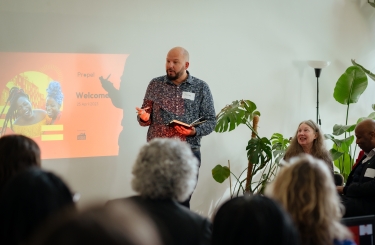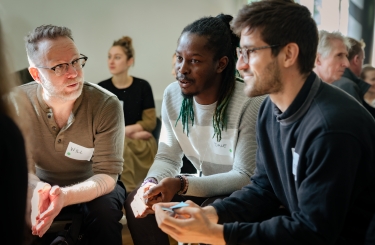By Emily Dyson (Deputy Director, IVAR), Sonakshi Anand (Senior Researcher, IVAR) and Malene Bratlie (Learning and Communications Manager, London Funders).
Over the last few months, IVAR has been running workshops with local authorities across the UK – including with London Funders. We want to explore the relationship between the voluntary and statutory sector: specifically, if and how the Open and Trusting Grant-making approach could help to focus more of everyone’s time on the communities and causes they serve.
This work also helps inform London Funders’ current learning programme on reconsidering risk in the funding sector, where we’re currently exploring opportunities for sharing and thinking about risk differently across our network of funders.
About Open and Trusting
In response to Covid-19, grant-making practice changed overnight: quick application processes, limited or no reporting requirements, flexibility over how money could be spent. At IVAR, we wanted to hold onto these positive changes for the long-term – so we set up the Open and Trusting Grant-making community. This built on London Funders’ ‘We stand with the sector’ statement at the start of the crisis, which over 400 organisations signed – pledging to adapt activities, be financially flexible, and to listen.
We believe that how we make grants matters: who we reach, how we assess applications, the kind of funding we give and the relationships we make:
Working towards shared goals, by making the most use of precious resources on both sides, will lead to greater impact and benefit.
This community has grown to over 120 independent funders – and now, we want to look at how the same commitments could apply to government grant-making.
Why now?
IVAR run regular peer support sessions for charity leaders, which helps to build our understanding of the challenges they are facing. The pressure that both statutory services and charities face in meeting local needs is a clear theme:
The issue is that everyone is at full capacity, including statutory services who, in our area certainly, have a strategy of signposting to the third sector. That then ‘ticks the box’ that support is found but, without funding, it breaks the third sector.
This project is also timely in light of the recent Directory of Social Change report, which estimated that Local Authorities in the UK make £600m annual grants to VCSE organisations. Their recommendations include that: ‘local authority commissioners and legal departments need to be aware that they can legitimately make grants to VCSE sector organisations. There is no evidence that grants involve a greater risk of legal challenges than contracts, and this lack of understanding is not a valid reason for avoiding grants programmes or for using contracts by default in commissioning’.
Earlier this autumn, London Funders spoke to a representative sample of the independent and public funders in our membership – one of them called attention to a 70% increase in demand for their funding this year compared to last. We also know anecdotally that this is the case for many funders. When demand for funding is at an all-time high, it is key that we make sure the processes put in place are as effective as possible, both for funders and charities.
What we’re hearing
IVAR has run workshops across the UK – in London, Yorkshire, Glasgow and beyond. At our first workshop with London Funders, we asked about what kind of relationship Local Authorities wanted with the voluntary sector – and explored how far current practice already fits with the eight Open and Trusting commitments.
At London Funders, we know that several local authorities are already taking steps toward more open and trusting grant-making practices by listening, involving local communities and making the application process less burdensome. But as we’ve heard through the workshops, local authorities face unique challenges in adopting more flexible funding practices and changing systems and ways of working can take time.
How can we push boundaries and break from how things have always been done in a system that has not made this easy? What are the levers to pull and what infrastructure is needed to do things differently and take risk?
When reflecting on how Open and Trusting could be applied to the local authority context, a number of key messages emerged:
- Share examples and build the evidence base: While we heard examples of how local authorities were practising the eight commitments, people felt a clear description of what ‘good’ looks like for each commitment would be helpful. There are also opportunities to strengthen the case for Open and Trusting by building the evidence base, for example understanding the impact of unrestricted grants.
- Local authorities are seen as a 'closed system', making it harder for charities to know what they can ask for in terms of flexibility. Additionally, charities don’t always trust or believe that a local authority is doing things differently. More dialogue with charities would help them know what they can ask for. This could start with the local Council for Voluntary Services (CVS), who can support with grant-making processes. However, it’s important to build relationships not only with groups and established charities who are funded, but also those who aren’t in receipt of funding.
- Challenges around being ‘proportionate’: Smaller grant values offer some proportionate reporting, but monitoring information increases for grants over £50k, and some prescribed outcomes are often seen as the minimum expectation with large-scale grants. Balancing flexibility with statutory requirements will take time and patience, but for charities, the rewards of simpler processes are significant.
- Go beyond grant-making: We talked about exploring how the eight commitments can be brought to life across local authorities as a whole, i.e. how to influence beyond grant-making into commissioning processes: ‘It is about understanding the local authority experience as a whole for charities (both commissioning and grant-making) and ensuring the different parts of the council have consistent relationships with communities’.
- Balance tradition with change. Local authorities have established ways of working which can take time to adapt. Despite this, progressive practice is taking place to bring people together and test out new ideas. This is why it is important to celebrate internal 'wins' and recognise change even when it is not visible externally: ‘How can we push boundaries and break from how things have always been done in a system that is not made to allow this easily? What are the levers to pull and what infrastructure is needed to do things differently and take risk?’
Next steps
There are some knotty questions left to unpick, raised in our discussions across the UK:
- How can we respect the spirit of being open, while also enabling local authorities – which are large organisations with multiple lines of accountability – to sign up to this journey? For example, trusts and foundations publish what they are doing against each of the eight commitments – this may be harder for local authorities to commit to as a first step.
- What are local authorities legally required to do when working with charities and community organisations, and how can they have open discussions about this with their legal departments, who may not be experts in charity law?
- How to manage the ‘political’ element of grant-making in local authorities – which is key to enabling a consistent and light-touch approach with grantees.
We’ll be exploring these with the networks and organisations we’ve worked with in London, Yorkshire, Glasgow and beyond over the next few months. Our hope is to initiate a Community of Practice for public agency grantmakers in early 2024. The insights that have already emerged from this work is helping to shape London Funders’ current learning programme, ‘Reconsidering Risk’ where we hope to dig deeper into what it will take to help us manage risks in a way that leads to better decision-making and action from funders.
We also know that collaborating across sectors is key to enabling change in funding practices – at London Funders, we are working with both local authorities and independent funders in our membership to develop a shared, cross-sector approach to due diligence to help funders take a different approach to risk, and ultimately ease the burden on charities applying for funding.
Deep and meaningful reform to UK grant-making is within reach – by working together we can push our collective, evolving understanding of barriers, incentives and levers for change.
This blog is jointly published by IVAR and London Funders.


